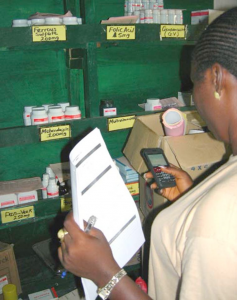Pharmacy supply chain management / Photo credit: JSI
It’s often said that “what matters gets measured, and what gets measured gets done.” As technology becomes more powerful, more accessible, and more customizable than ever before, measuring of activities, processes, and outcomes has become much, much easier than ever before. Data, once a scarce resource, is now becoming an available tool we can use to drive significant social change.
From monitoring elections in Africa to improving rural education in Asia to improving the environment in America, this means that opportunities are greater than ever before to harness data for the greater good.
Data’s Role in Education
Most schools in poor countries measure very little of attendance, grades, teacher attendance, etc. Camfed is just one example of an organization that is changing this. An early Magpi user, Camfed works with the educational systems in some of the poorest areas of Malawi, Ghana, Zambia, Zimbabwe, and Tanzania to encourage girls and young women to attend school – and they’ve been a pioneer in using mobile data collection to monitor and improve school performance and their own performance.
Data’s Role in Global Health Supply Chain
Although originally designed for public health surveys, Magpi mobile data collection was adapted early on by users to create basic (and now increasingly sophisticated) supply chain management systems – many of them in global health.
One example of this is the work done by John Snow Inc (JSI) in Rwanda, Ethiopia, Malawi, and elsewhere to collect data and analyze the stock available for certain medications for children – including those to treat malaria, diarrhea, and pneumonia. This process has allowed JSI to improve both the speed and accuracy of their supply chain, improving access and availability of these vital medications for tens of thousands of community health workers in these regions.
Data’s Role in Combating Child Labor
The decreasing cost of mobile data tools, and the increasing reach of the network, means that they’re now available even in otherwise very undeveloped regions – regions that do not often receive outside scrutiny. Groups like Pact and BSP are working now in the Democratic Republic of Congo and elsewhere to gather information about the mining process and to verify the presence and extent of child-labor, along with certifying that the process is conflict-free.
As an example of the ease with which these tools can be deployed, Pact was able to build a new survey, train their data managers, and place the form on phones in just one week – without any need for programming or outside technology consultants.
How Data Can Keep Driving Social Change in Smart Ways
The ability to gather, analyze, and respond to field data in real-time is new, but is spreading rapidly — and becoming an essential tool not just in business but for those working to combat disease, address human rights abuses, spread democracy, and reduce inequality.
Much of this improvement in the acquisition and use of data has been driven by advances in mobile and web technologies. The data has always been there – theoretically – but the tools needed to capture that information, gather it together and view it seamlessly are becoming more accessible and easier to implement. Mobile deployments that used to be dependent on expensive hardware and even more expensive technical expertise were slow to spread, but low-cost, easy-to-use systems like Magpi are driving costs down and deployments up all over the world.
This means more and more that those interested in creating a better world are able to “measure what matters” and get things done.
–––
Learn more about how data collection can change lives and how it might be able to help you address key concerns in your operations:
Mobile Data Collection Guide
How mobile data collection has become a viable and powerful option for many companies





